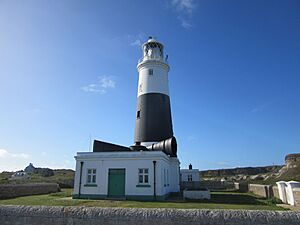Alderney Lighthouse facts for kids
| Location | Alderney English Channel |
|---|---|
| Coordinates | 49°43′45″N 2°09′51″W / 49.7292°N 2.1643°W |
| Year first constructed | 1912 |
| Automated | 1997 |
| Construction | granite tower |
| Tower shape | conical tower with balcony and lantern attached to keeper's house |
| Markings / pattern | white tower with one broad black band |
| Height | 32 metres (105 ft) |
| Focal height | 37 metres (121 ft) |
| Original lens | 1st Order 920mm 4 panel Catadioptric (original), 2 X 4-tier LED Lantern (current) |
| Intensity | 4,140 candela |
| Range | 12 nautical miles (22 km; 14 mi) |
| Characteristic | Fl W (4) 15s |
| Fog signal | siren: 3 blasts every 20 seconds whistle: 2 blasts ever 15 seconds |
The Alderney Lighthouse, also called Mannez Lighthouse, is a strong stone lighthouse. It stands on the northeast coast of Alderney island. This lighthouse was built in 1912. Its main job was to keep ships safe. It protected them from the tricky waters of the Alderney Race. It also warned them about the many rocks around Alderney.
Contents
History of the Lighthouse
Building the Lighthouse
The Alderney Lighthouse was built from granite rock. This happened in 1912. A local businessman named William Baron helped guide the building work. The lighthouse was very important for ships. It helped them navigate safely through the English Channel.
Modern Changes to the Lighthouse
In 1976, the lighthouse got electricity. This made it much more modern. Then, in 1997, it became "automated." This means machines took over its work. The last person who lived there as a lighthouse keeper left. Today, the Trinity House Central Planning Unit in Essex looks after it. They make sure it works correctly.
Lighthouse Operations and Tours
Even now, the Alderney Lighthouse still works. It helps guide ships every night. During the summer, you can even visit it. Guided tours are available for people to learn more. The Alderney Railway connects the lighthouse to the rest of the island. This makes it easy for visitors to reach.
Changes to the Light Signal
In March 2011, the lighthouse's light was changed. It used to shine all day and night. Its light could be seen from far away, about 23 nautical miles. Now, it only shines when it's dark. Its light can be seen up to 12 nautical miles away. The main, older light beam was turned off. New LED lamps on the tower now provide the light pulse. The fog signal, which used to make sounds in foggy weather, was also stopped at the same time.
More to Explore
- List of lighthouses in the Channel Islands
External Websites
- Trinity House


